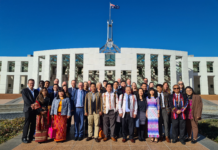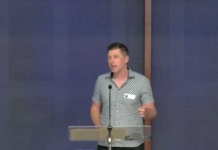in the light of the biblical command not to kill

Have you ever wondered about the gap between the biblical command “You shall not kill” and the multitude of ways in which people – including Christians – kill other people? Tragically, it happens in the womb, in the context of family violence, through fits of alcohol-induced rage.
It happens for economic, political, racial and religious reasons. And it can happen by state authority, in the form of lawful police action, offensive or defensive war, and the administration of capital punishment – although the latter was abolished in Australia in 1967.
Here I want to focus on war. A Christian is a citizen of this world and of the world to come (Php 3:20; 1:27). When these two commitments are in conflict, as occurs from time to time, which one actually takes precedence? Do I follow conscience or country? Scripture or state? Christ or Caesar? Given the biblical command not to kill, is it ever right to engage in a war – in lawful armed intervention against an enemy state?
In Living By the Sword? Anglican bishop Tom Frame declares that there is
a wide range of circumstances in which force can and must be used, and that the ends for which this force is used impart to military service a certain nobility and morality that is not discounted by the regrettable and tragic circumstances that prompt it… War can never be abolished, or armies be made redundant, while there is human sinfulness – and the obligation to resist evil remains. To say that there will be times when force is needed does not discredit or cancel out the call to work for the transformation of unjust structures or the responsibility to chastise those who resort to force without adequate justification, or who justifiably resort to force but use excessive amounts, or who apply it for the wrong reasons. Knowing the time and the place in which the ‘sword’ can or ought be drawn will continue to determine whether its use will bring humanity nearer to heaven or to hell.”
Those who follow Jesus generally have a high regard for Holy Scripture. We take the Bible’s teachings seriously, and want to be “doers of the word” (James 1:22). We want to honour our Lord by endeavouring to back up our words with faithful actions.
We listen to what we understand God to be saying to us through “the Word of God written.” And we place this witness, these truths and rumours of Truth, in the context of the whole of Scripture.
So when we observe that one of the famous Ten Commandments specifically prohibits intentional killing, and apply that principle to what we see around us, and what we have allowed to pass as law and regulation, significant ethical and theological questions arise.
But in practice, our attitude toward war may not be primarily shaped by biblical principles. It may be shaped by our family history, our parents’ religious and moral views, our sense of patriotism, duty to country, or a desire to engage in military combat to gain experience of the world, or personal status or glory.
How Christians think about war is also related to our views about philosophy and politics, regardless of how well informed or ill-defined those views may be. It is linked to our perspective on whether a Christian may use force to bring about just changes. Or perhaps we simply do not think critically and Christianly about ethical issues such as war.
The Bible never glorifies warfare, yet armed conflict features regularly in its pages. We may think of the Old Testament as celebrating war and the New Testament as celebrating peace; or the Old Testament God as vengeful and vindictive and the New Testament God as gracious and genial.
We may identify war in the Old Testament as holy war, while we feel the New Testament supports pacifism, and church history after Constantine and Augustine advocates the higher good of just war. Within Old Testament history we may discern an early tribal warlike ideology that gradually gives way to the more progressive and pacifist views of the eighth century prophets.
But the reality is clearly more complex. For example, Exodus 20:13 declares “you shall not murder”; but Genesis 9:6 seems to give clear justification for murder. Or take Exodus 14:13, which appears to articulate a preference for pacifism, but contrast that with Exodus 17:8-13, which describes divinely approved warfare.
The New Testament similarly addresses a range of issues and perspectives on war and peace, conflict and shalom. In Luke 3:14, for example, John the Baptist receives some soldiers as converts to his movement. He does not demand that they lay down their weapons and walk away from their vocation and livelihood; rather, he merely asks them not to misuse their military power.
In Matthew 10:34 Jesus says, “Do not suppose I have come to bring peace to the earth. I did not come to bring peace, but a sword.” Yet in Matthew 26:47-52 Peter uses a sword to wound an opponent who is trying to arrest Jesus, and Jesus orders Peter to put his sword away.
In Romans 12:17-21 Paul teaches that a Christian should not repay evil for evil, should live at peace with everyone, and when confronted by an enemy should offer him food and drink. Yet the next seven verses (13:1-7) provide the strongest biblical support for the submission of the individual citizen to governmental authority.
The Old Testament presents a complex perspective, or more than one perspective, on war. Narrative and propositional passages often appear to support militarism and pacifism. The New Testament presents a somewhat different perspective. Jesus is the Prince of Peace (cf Isa 9:6) who came to establish a community and commend a lifestyle characterised by shalom.
Jesus chose as his weapon not a sword but a cross. He fulfilled his God-given mission not through war against the Romans, nor through violent overthrow of religious opponents, but through pacifist teaching, nonviolence and martyrdom.
Consider Matthew 26:47-52. Jesus has just celebrated the Last Supper, knowing that Judas has left to betray him. He walks to Gethsemane to pray. Judas arrives to do his business, to betray his Master, accompanied by a mob armed with swords and clubs.
Peter steps forward, swings his sword, and severs the ear of the nearest thug. Jesus heals the wounded man, and says to Peter, “Put your sword back in its place, for all who draw the sword will die by the sword” (v 52).
Is Jesus advocating pacifism? Does he endorse a lifestyle of nonviolence? When Tertullian declared in relation to Matthew 26:52, that “The Lord, in subsequently disarming Peter, disarmed every soldier,” he was arguing on philosophical or moral grounds, not on biblical grounds.
As Matthew has it, Jesus did not disapprove of Peter carrying a sword but of its unjust use. The moral question of using a sword (or other weapon) in order to kill people on behalf of the state is of central importance to an ethics that is Christian, and to the moral formation of those who choose to follow the teaching and example of Jesus.
Historically Christians have made six responses to the issue of militarism, armed intervention or war:
- crusade: “this is God’s holy war!” (i.e. religious zeal)
- national interest war: “my nation, right or wrong!” (i.e. patriotism)
- just war: military conflict justified on a case-by-case basis according to predetermined ethical criteria.
- non-resistance: participation in military conflict as a non-combatant (e.g. ambulance, chaplaincy)
- pacifism: nonviolence based on the general principle that all war is wrong and should not be supported by a Christian.
Many sound reasons can be given as to why each of these views has persisted or given way to others. I would suggest that most thoughtful Christians today support the just war position. They distinguish the notion that an individual Christian should be a peace advocate from the God-given duty of government to restrain and punish evil.
At the same time, many would want to consider a sixth response – that of just peacemaking. Just peacemaking is viewed by the late Baptist ethicist Glenn Stassen as an alternative to the common choice made by many people of faith between pacifism and just-war theory. It is a multidisciplinary approach which includes practices such as:
- sustainable economic development
- advancement of human rights, democracy and religious liberty
- working with emerging cooperative forces in the international system
- cooperative conflict resolution
Just peacemaking seeks effective ways to restore a just and enduring peace before opposing parties resort to the last resort, and begin killing each other. In my view, this approach needs wider publicity and more practical support at every level.
The just war approach seems to me to provide a close fit with the range of biblical teaching on peace and conflict, while taking seriously the ethical issues of modern warfare. But the just war approach does not adequately speak to the new challenges of nuclear war, or religiously based terrorism of the kind we have seen since September 11, 2001.
In my view, there is a legitimate place within Christian ethics for realism and pragmatism as we approach sensitive discussions and ethical responses to issues of armed intervention and conflict, especially at the level of national and international conflict. This view will not be well received by my more radical and idealist Christian friends, but it is a view worth considering.
In Christianity and Power Politics, published in 1948, theologian and ethicist Reinhold Niebuhr offers this cautionary advice:
It is a terrible thing to take human life. The conflict between man and man and nation and nation is tragic. If there are men who declare that, no matter what the consequences, they cannot bring themselves to participate in this slaughter, the Church ought to be able to say to the general community: We quite understand this scruple and we respect it. It proceeds from the conviction that the true end of man is brotherhood, and that love is the law of life.
We who allow ourselves to become engaged in war need this testimony of the absolutist against us, lest we accept the warfare of the world as normative, lest we become callous to the horror of war, and lest we forget the ambiguity of our own actions and motives and the risk we run of achieving no permanent good from this momentary anarchy in which we are involved.”
What can we do to shift this from a mere intellectual debate into specific actions aimed at doing God’s will in our nation and world? Here are three suggestions:
• pray individually and in a small group for peace in our world, and for political leaders and military personnel, using media reports as a guide
• support peace work through local awareness raising and fundraising initiatives
• volunteer with a parachurch agency or NGO directly involved in peace and justice work, such as Christian Peacemaker Teams, Amnesty International or the Ecumenical Accompaniment Program in Palestine and Israel.
Until Jesus returns, there will be wars and rumours of war. But amid the strife, those who follow Jesus can point to a better way, and model the peaceable kingdom of God in small and large ways as the Spirit of God ignites our imagination and courage.
Rev Rod Benson serves as Ethicist and Public Theologian with the Tinsley Institute, Morling College, Sydney.



































